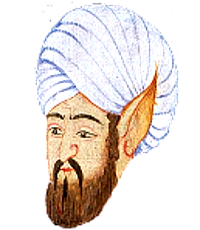Mosheh ben Maimon
Mosheh ben Maimon was a scholar, judge and medical doctor, born into an influential Jewish family in Córdoba in 1135 CE. He is known as “Musa Ibn Maymun” in Arabic and as “Moses Maimonides” in Latin. Ben Maimon was trained both in the Jewish and the Arabic intellectual traditions and he wrote in Judeo-Arabic, a classical form of Arabic which used the Hebrew script. Ben Maimon is most famous as the author of the fourteen volume Mishneh Torah, a sprawling collection containing all the laws and regulations that govern Jewish life. The Mishneh Torah is widely read and commented on to this day.
In 1148, when the Almohad rulers of al-Andalus imposed their harsh reforms on their subjects, Christians and Jews were required to either convert or be killed. Ben Maimon and his family escaped to Egypt which at the time was run by the Fatimid caliphs, a far more tolerant regime. In Cairo he established himself as an interpreter of the Torah and as a teacher in the Jewish community. This is also when he wrote his most famous philosophical work, Guide for the Perplexed.
We are very knowledgeable about Ben Maimon’s life thanks to the Cairo Geniza, a collection of up to 300,000 fragments of manuscripts discovered in the synagogue in Cairo. Since Jews were afraid to throw away any piece of paper which may have the name of God written on it, they ended up with a very large collection of scraps of papers of various kinds. The texts were preserved to this day in the Geniza and this includes Ben Maimon’s personal notes and correspondence.
Ben Maimon is buried in Tiberias, in what today is Israel. On his death, the story goes, he wanted to be buried in the land of his forefathers. Yet Ben Maimon would no doubt have objected to being made into an Israeli citizen after his death. More than anyone else Ben Maimon symbolized the very tight connection that has existed between the Muslim and the Jewish heritage. Meanwhile the Jewish community in Cairo which as recently as in the 1920s comprised some 80,000 people has dwindled to fewer than 200 today. There is a tradition among them that Ben Maimon’s body never was transferred to Tiberias and that he still is buried in Cairo.
External links
- Cities of Light: The Rise and Fall of Islamic Spain
- Download the Geniza app!
- Jewish Encyclopedia, "Maimonides"
- Modern Jewish History: The Cairo Genizah
- Sephardic Pizmonim Project
- Shelomoh Dov Goitein, “A Mediterranean society: the Jewish communities of the Arab world as portrayed in the documents of the Cairo Geniza”
- Siddur Zehur Yosef
- Stanford Encyclopedia of Philosophy, "The Influence of Islamic Thought on Maimonides"
- University of Chicago, "Maimonides"

